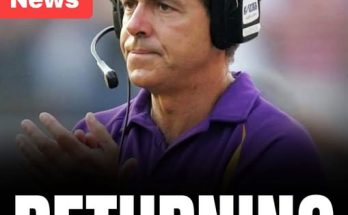Paul Finebaum has never been one to hold back his opinions, and once again, the veteran ESPN analyst has set the college football world buzzing. This time, his target is Ole Miss head coach Lane Kiffin, a man whose name seems forever tied to both brilliance and controversy. During a recent appearance on ESPN Radio, Finebaum made headlines with a bold claim: “Lane Kiffin still has one foot out the door at Ole Miss — Florida or LSU could be his next move.”
The remark wasn’t just a throwaway line meant to fill air time. Finebaum’s comments struck a chord because they touch on a deeper truth many around the SEC quietly acknowledge — that Lane Kiffin, for all his offensive genius and charisma, has never truly settled down anywhere. His coaching career, dotted with high-profile stops and even higher drama, reads like a map of opportunity and restlessness. From USC to Tennessee, from Alabama to FAU, and now at Ole Miss, Kiffin has been both the darling and the disruptor of college football. Finebaum’s suggestion that he might already be eyeing the exit from Oxford only adds more intrigue to one of the SEC’s most unpredictable coaching stories.
Finebaum’s comments came in the wake of Ole Miss’ rollercoaster season — a campaign that has showcased Kiffin’s offensive creativity but also highlighted the limitations of the program in the current SEC landscape. The Rebels have remained competitive, even flirted with contention, but they haven’t quite broken into that elite echelon of programs capable of challenging Georgia, Alabama, or LSU year after year. And that, Finebaum argued, is precisely the problem. “Kiffin’s too ambitious, too restless to stay somewhere where there’s a ceiling,” Finebaum said. “He loves the SEC spotlight, but I’m not sure Ole Miss gives him the platform he really wants. You can’t convince me that if Florida or LSU came calling, he wouldn’t listen.”
For many Ole Miss fans, those words sting — not because they seem impossible, but because they feel plausible. Kiffin has done a remarkable job of elevating the Rebels into a national conversation. His recruiting has improved dramatically. His use of the transfer portal has been masterful. And his swagger — equal parts confidence and mischief — has given Ole Miss a brand identity that few SEC teams can match. Yet the idea that he could leave, especially for another SEC rival, reopens old wounds about loyalty and ambition. In an era when coaches jump from one massive paycheck to another, Finebaum’s insinuation taps into a deep vein of skepticism about what motivates modern college coaches.
Kiffin, to his credit, hasn’t addressed Finebaum’s remarks directly. But his history speaks volumes. When he was the offensive coordinator under Nick Saban at Alabama, Kiffin transformed the Crimson Tide’s offense into a dynamic, high-scoring machine. His success made him a hot commodity, and it wasn’t long before he bolted for a head coaching opportunity at Florida Atlantic. His time there reminded the college football world that Kiffin still had the magic — turning a struggling Group of Five team into a conference champion. From there, Ole Miss came calling, and the rest has been a fast-paced, headline-generating ride.
But beneath the success lies a pattern. Kiffin’s tenure at each stop has been marked by short bursts of brilliance followed by an exit just as things start to stabilize. He has often seemed like a man searching for the perfect fit — a place that matches his ambition, personality, and desire for both control and spotlight. Finebaum’s claim that Florida or LSU could be his “next move” feels, therefore, less like speculation and more like the continuation of a storyline that has defined Kiffin’s career.
Florida, for one, would make sense in many ways. The Gators have endured uneven results under Billy Napier, and whispers about his job security have only grown louder with each loss. Florida remains one of the SEC’s true blue-blood programs, with a history, fan base, and recruiting territory that could appeal to someone like Kiffin. He thrives in environments that allow him to build dynamic offenses and command national attention — something Gainesville offers in abundance. It’s not hard to imagine Kiffin reviving the “Fun ‘n’ Gun” spirit of Steve Spurrier with his own modern twist, turning the Swamp into a must-watch spectacle every Saturday.
Then there’s LSU, another program Finebaum mentioned as a possible destination. Brian Kelly’s tenure in Baton Rouge has been solid but not spectacular, and some insiders believe the Tigers could look elsewhere if the team fails to return to championship contention. LSU, with its deep talent pool, passionate fan base, and history of winning, represents exactly the kind of high-profile opportunity that might tempt Kiffin. Moreover, it would give him the chance to go head-to-head with Nick Saban and Kirby Smart on a more level playing field. As Finebaum noted, “If you give Lane Kiffin LSU’s roster, watch out. He’d be dangerous.”
Beyond the speculation, though, Finebaum’s remarks raise a bigger question about what Kiffin really wants. Is he content being the maverick coach who brings excitement and unpredictability to a mid-tier SEC program? Or does he crave the validation that comes with leading a powerhouse to national titles? Kiffin has matured significantly from his early days as the brash, impulsive young coach who clashed with athletic directors and burned bridges. His leadership at Ole Miss has shown growth, both personally and professionally. He’s more composed, more strategic, and, in many ways, more relatable. Yet his restless energy remains unmistakable.
Those close to the program say Kiffin still talks openly about wanting to compete for championships, not just bowl games. That mindset could easily lead him to explore bigger stages if they open up. One former SEC assistant put it bluntly: “Lane’s loyal to winning. That’s it. He loves Ole Miss, but if a place gives him a better shot to win it all, he’s gone. That’s just who he is.”
Meanwhile, Finebaum’s comments have sparked intense reactions across social media. Ole Miss fans have defended their coach, pointing to his loyalty over the past few years and his commitment to building a program “the right way.” Critics, however, argue that Kiffin’s track record speaks for itself — that no matter how much he talks about “home,” he’s always thinking one move ahead. The debate underscores just how polarizing Kiffin remains in college football circles. He’s loved and loathed in equal measure, admired for his offensive mind but questioned for his long-term staying power.
What’s undeniable is that Kiffin’s presence has transformed Ole Miss. The Rebels are no longer an afterthought in the SEC West; they’re a legitimate threat capable of upsetting anyone on any given Saturday. His recruiting efforts have brought in elite talent, and his use of analytics and innovation have kept the program ahead of the curve. Even Finebaum admitted as much during his radio appearance: “There’s no question Kiffin’s done a phenomenal job at Ole Miss. He’s made them relevant in a way few thought possible. But that’s what makes this all the more intriguing. When a guy like that builds something, you start wondering when he’ll move on to build the next thing.”
The truth is, Finebaum’s speculation may never materialize. Kiffin might very well stay in Oxford for years, content with the program he’s molded into a perennial contender. He’s established a strong relationship with his players, enjoys genuine support from the university, and seems to relish his role as a provocateur in college football’s most competitive conference. But even so, the whispers will continue — because with Lane Kiffin, the future is always uncertain. His charisma, his ambition, and his ever-present wanderlust make him one of the sport’s most fascinating figures.
For now, Ole Miss fans can only hope that Finebaum’s words are just that — words. They’ll cling to the belief that Kiffin’s connection to the school runs deeper than a passing opportunity. But in the back of their minds, they know that with every great win and every national headline, the lure of something bigger might become too strong to ignore. Finebaum, as always, knows how to touch a nerve, and in doing so, he’s reignited one of college football’s favorite debates: Is Lane Kiffin home at last, or simply waiting for the next door to open?
In the end, Finebaum’s statement is less about gossip and more about the nature of modern college football — a world driven by ambition, opportunity, and constant movement. Kiffin embodies all three. He’s a coach who thrives on challenge, lives for innovation, and refuses to be ordinary. Whether he stays or goes, his impact on Ole Miss — and the SEC — is undeniable. And as long as his name continues to generate headlines, one thing is certain: Paul Finebaum will always be there to stir the pot, reminding everyone that in college football, the drama never stops.



